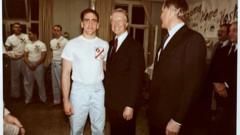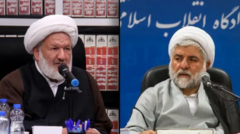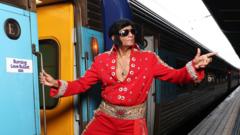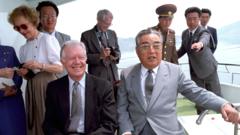Rocky Sickmann, once a 22-year-old US Marine, was among the 52 Americans taken hostage in Iran on November 4, 1979, a crisis that defined Jimmy Carter’s presidency. Reflecting on this traumatic experience, Sickmann shares how Carter’s commitment to their safety and the global awareness surrounding their ordeal provided him with hope. Despite the public’s frustration with Carter’s inability to secure their release during a tumultuous presidency, Sickmann recounts a personal bond and appreciation for the former leader's efforts to support him and his family throughout their captivity, culminating in a poignant reunion years later.
**How Jimmy Carter Became a Lifeline for Iran Hostage Rocky Sickmann**

**How Jimmy Carter Became a Lifeline for Iran Hostage Rocky Sickmann**
Rocky Sickmann recalls the profound impact of former President Jimmy Carter during his time as a hostage in Iran, revealing how the ex-president’s dedication helped sustain hope.
Out of the many mourning former President Jimmy Carter, not everyone can say he saved their life. Rocky Sickmann was a 22-year-old US Marine stationed at the American embassy in Tehran, Iran, when he and 51 other Americans were taken hostage by Iranian revolutionaries on 4 November, 1979. It defined his life - as well as much of Carter's presidency.
"For the first 30 days I'm sitting in this room handcuffed and blindfolded, thinking the Vietnam war had just ended, and nobody cared about these thousands of veterans coming home," said the 67-year-old. "Who's going to care about the Iran hostages?" At the time, Mr. Sickmann was uncertain about President Carter's level of concern. Many public sentiments echoed this skepticism, blaming Carter for the lengthy ordeal. Political historians often cite this crisis as a significant factor in Carter's loss to Ronald Reagan in a landslide, contributing to his one-term presidency.
However, Sickmann asserts that Carter deserves admiration for his steadfast dedication to securing their release. "He was a good man who wanted diplomacy. I found out after how deeply involved he was. He knew my parents. He took care of them; he would meet them in DC."
When Sickmann finally met Carter, freshly flown to Wiesbaden, Germany, after a year in captivity, he joked about meeting his commander-in-chief in pajamas: "How do you meet your commander-in-chief dressed like that!" This significant encounter happened a day after their release when Carter personally welcomed them.
"It was a very exciting day because he used to be in the Marines, and he said to meet us was the happiest day of his life." Their meeting became a cherished memory captured in a photograph, sent by Carter to Sickmann ten months post-presidency, with the inscription: 'To my friend, Rocky Sickmann.'
Sickmann crossed paths with Carter again ten years ago at a baseball game in Georgia, showcasing a bond that persisted over the years. "He reads it - all of a sudden he gets up and he stands up and he turns around. I stand up, and we waved at each other."
Inspired by Carter's legacy, Sickmann pursued charitable endeavors, founding Folds of Honor, a charity providing scholarships to families of America's fallen or disabled military personnel and first responders. "President Carter was a good Christian man, married to his wonderful wife, and continued his life of service. I don't know if I'll ever be as good as him, but I hope to be able to do the same thing."
The charity honors the eight US servicemen killed during an ill-fated rescue mission in 1980, known as Eagle Claw, which politically sealed Carter's fate despite winning the Democratic nomination. Today, while the Iran hostage crisis remains a dark chapter in Carter's legacy, Sickmann feels eternally grateful.
"Morning, noon, and night, for 444 days, I never prayed so hard in my life, hoping that God was on our side. But also, President Carter kept us alive. He kept us in front of the world, making sure that people were praying for us (too)."





















